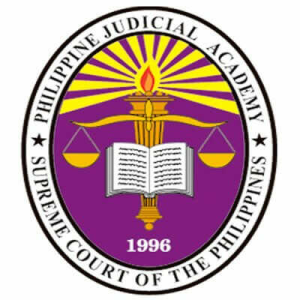History
The Philippine Judicial Academy was created by the Supreme Court on March 12, 1996, under the leadership of then Chief Justice Andres R. Narvasa, through the issuance of Administrative Order No. 35-96 Establishment of the Philippine Judicial Academy (PHILJA). It received its mandate on February 26, 1998, through Republic Act No. 8557 An Act Establishing the Philippine Judicial Academy, Defining its Powers and Functions, Appropriating Funds Therefor, and for other Purposes. This law institutionalized PHILJA as a “training school for justices, judges, court personnel, lawyers, and aspirants to judicial posts.”
When Chief Justice Hilario G. Davide, Jr. took his oath on November 30, 1998, he pledged to make the Supreme Court and the whole Judiciary worthy of public trust and confidence. He saw the vital role that continuing judicial education plays in ensuring judicial competence and efficiency. Given this “daunting task of institutionalizing continuing judicial education,” Chief Justice Davide remarked, is the PHILIPPINE JUDICIAL ACADEMY (PHILJA), “the [Supreme] Court’s implementing arm and the nation’s watchdog in the pursuit of excellence in the Judiciary.”
The Philippine Judicial Academy, a separate but component unit of the Supreme Court, has become an all-important factor in the promotion of judicial education in the Philippines. It receives full patronage and support from the Court which guarantees the participation of judges and court personnel in its programs and activities. In fact, no first and second level trial court judge would commence the discharge of adjudicative functions without undergoing the related courses prescribed by the Academy. The Judicial and Bar Council, constitutionally tasked to recommend appointments and promotions to the Judiciary, is also directed by law to consider the participation of judges in the programs of the Academy, pursuant to Republic Act No. 8557.
The Academy used to conduct its activities mainly at the former Ridge Convention Center, a facility located on a 3.7 hectare prime lot in Tagaytay City. This property was turned over to the Supreme Court on July 19, 1995, by then President Fidel V. Ramos, particularly for the Academy’s judicial and legal education activities. Following the donation to the Supreme Court of the shares of the stockholders (Appendix C PDCI List of Donors) of the Ridge Sports and Country Club Corporation (RSCCC), the facility was converted to the PHILJA Development Center, Inc. (PDCI) on June 5, 2003. In July 2008, the PHILJA Development Center was renamed the PHILJA Training Center, in order to avoid confusion with the corporate entity known as the PHILJA Development Center, Inc. (PDCI). With a generous P300M Non-Project Grant Assistance Counter Value Fund (NPGA-CVF) from the Government of Japan, PHILJA completed the construction of the PHILJA Training Center (PTC) in 2010, now the venue for many of the Academy’s training activities. The Center’s acquisition of modern furniture, fixtures and equipment for its training and meeting rooms and lodging facilities were made possible through funds from the World Bank. The PTC has since successfully hosted seminars, orientation and capacity building programs, various meetings and site visits, helping sustain the Academy’s vision and mission for judicial excellence while it leads in the field of judicial education.
Retired Supreme Court Associate Justice Rosmari Declaro Carandang was appointed as Chancellor of the Philippine Judicial Academy on February 22, 2022. She took her oath as the fourth, and second female, PHILJA Chancellor before Chief Justice Alexander G. Gesmundo on February 23, 2022 at the Supreme Court En Banc Session Hall. Justice Carandang is expected to steer the Academy to even greater heights and develop its niche as the premier judicial institution providing globally relevant, responsive and effective training for the Judiciary in the ASEAN region.
PHILJA’s former illustrious chancellors were Justice Arturo D. Brion (June–October 2021), Chancellor Emeritus Justice Adolfo S. Azcuna (June 2009–May 2021), and Founding Chancellor Emeritus Justice Ameurfina A. Melencio Herrera, who was at the helm for 13 years (1996–May 2009).
Philosophy and Objectives
PHILJA adheres to the following philosophy:
- The people are best served when the Judiciary is independent and its members are women and men of proven competence, integrity, probity, and independence.
- Judicial education is an indispensable tool for ensuring an effective, independent and credible Judiciary.
PHILJA pursues the following objectives:
- To foster sound values and attitudes, expertise in substantive and procedural laws; and develop management competence through courses, seminars and symposia for members of the Judiciary and quasi-judicial bodies;
- To contribute to available legal literature of scholarly and practical significance to benefit the members of the Judiciary through the publication of a Judicial Journal and a Bulletin;
- To integrate the Academy’s philosophy, principles and objectives and instructional programs in conventions, seminars, and other activities of the associations of judges and court personnel;
- To conduct research to advance the frontiers of juridical science and court technology;
- To develop and strengthen networking and partnership with other institutions towards the development and implementation of programs for continuing judicial education.

